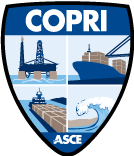
It might surprise you how many different groups we have within the Coasts, Oceans, Ports and Rivers Institute (COPRI). There are 10 Student Chapters, with one in Brazil, 10 Professional Chapters scattered across the country, including our newest chapter in Hawaii, and numerous committees covering awards, conferences, policy, publications and more. The leadership traditionally gathers at ASCE Headquarters in Reston, VA each February to get to know one another, to align on strategy, and complete training.
Like so many other events, this year's Leadership Summit had to be done virtually. I missed the face-to-face interactions of Summits past, but I came away from these on-line meetings excited by our leaders' commitment to professional development and the creativity displayed to continue serving our members. I'd like to share some of the discussion here.
Strengthening Connections
In difficult times it's important to come together. COPRI is the technical home for civil engineers and others working where water meets land. That's an enormous area of practice, and one facing unprecedented challenges. First and foremost, we are working to assure strong links between our committees, professional chapters and student chapters. Examples such as shared webinars and mock interviews were noted.
COPRI can broaden its sphere of influence by increasing awareness and cooperating with other organizations operating in the same space. At the Summit, we discussed many opportunities for cooperation. COPRI is one of nine ASCE Institutes, and there are often overlaps, such as in transportation, construction, structures. We discussed cooperative efforts to take on grand challenges, like the flow of goods from manufacturer to front door and the resilience of coastal communities to rising seas.
COPRI also interacts with independent organizations and governments. It's essential to interact with outside organizations to mesh social, legal and other issues with technical know-how to create successful solutions. In addition, COPRI provides technical advice to Federal and State governments to support creation of efficient, sustainable policy. At the Summit, we reviewed ASCE policy timelines and encouraged the identification of emerging arenas where technical white papers are needed.
Membership
Membership dues have become a lifeline for the society, as COVID curtails our ability to hold in-person conferences. Discussion at the Summit highlighted the direct benefits of membership, (free and low cost training, journals, guidelines and standards, and networks for professional development), as well as indirect benefits, (e.g. raising public awareness of the critical role engineers play in creating and maintaining the infrastructure and providing law-makers with unbiased technical data). The leaders were asked to increase membership by referring colleagues who would benefit from joining to ASCE's Member-Get-A-Member campaign. Locations for potential new chapters were also identified.
Diversity and Inclusiveness
With the events of the past year, we reflected on diversity within our organization and engineering, and discussed how we could provide more opportunity for anyone interested in a career in our profession. Building on ASCE Code of Ethics and ASCE Policy Statement 417, we have redoubled our commitment to producing equitable learning opportunities and conferences, acting to improve the COPRI pipeline performance with respect to women and minorities, and searching out and removing systematic practices that are incongruent with these aspirations.
We covered a lot of ground in the two days, with engaged reporting and heart-felt conversations, and we leave with an aligned mission to serve our membership and the public. I am hopeful that 2021 will be an exceptional year of change and progress.
Stay safe,
Steve Balint


